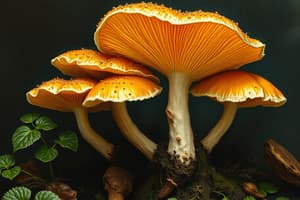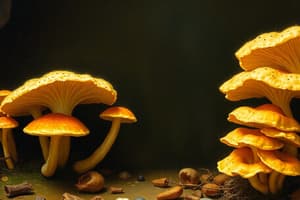Podcast
Questions and Answers
What are two examples of edible mushrooms and their contributions to food production?
What are two examples of edible mushrooms and their contributions to food production?
Two examples of edible mushrooms are Agaricus bisporus and Pleurotus ostreatus. They contribute to food production by being consumed directly and used in various culinary dishes.
Name an antibiotic derived from fungi and explain its importance in medicine.
Name an antibiotic derived from fungi and explain its importance in medicine.
Penicillin, derived from Penicillium chrysogenum, is an important antibiotic in medicine. It is widely used to treat bacterial infections, revolutionizing healthcare.
How do mycorrhizal fungi benefit agricultural practices?
How do mycorrhizal fungi benefit agricultural practices?
Mycorrhizal fungi enhance nutrient uptake in plants, particularly phosphorus. This symbiotic relationship improves plant growth and crop yields.
Describe a biotechnological application of fungi in industrial processes.
Describe a biotechnological application of fungi in industrial processes.
What role do fungi play in ecosystems as decomposers?
What role do fungi play in ecosystems as decomposers?
Flashcards are hidden until you start studying
Study Notes
Uses of Fungi
-
Food Production
- Edible mushrooms (e.g., Agaricus bisporus, Pleurotus ostreatus).
- Fermented products (e.g., tempeh, miso).
- Yeast in baking (e.g., Saccharomyces cerevisiae).
- Production of alcoholic beverages (e.g., beer, wine).
-
Medicine
- Antibiotics (e.g., Penicillin from Penicillium chrysogenum).
- Antifungal medications (e.g., Amphotericin B).
- Immunosuppressants (e.g., cyclosporine from Tolypocladium inflatum).
- Cholesterol-lowering drugs (e.g., statins from fungal metabolites).
-
Biotechnology
- Genetic engineering and fermentation processes.
- Production of enzymes (e.g., cellulases, amylases).
- Bioremediation (using fungi to break down pollutants).
- Mycoremediation (remediation of contaminated environments using fungi).
-
Agriculture
- Mycorrhizal fungi enhance nutrient uptake in plants.
- Fungal biopesticides for pest control (e.g., Beauveria bassiana).
- Fungi in composting to enhance soil fertility.
-
Research
- Model organisms for genetic and developmental studies (e.g., Neurospora crassa, Saccharomyces cerevisiae).
- Study of ecological relationships and biodiversity.
-
Industrial Applications
- Production of organic acids (e.g., citric acid, gluconic acid).
- Biopolymers and biofuels from fungi.
- Fungal enzymes for detergents and textiles.
-
Cultural Uses
- Traditional practices in various cultures (e.g., use of fungi in ceremonies).
- Art and crafts (e.g., dye production from fungi).
-
Environmental Impact
- Decomposers in ecosystems, breaking down organic matter.
- Nutrient cycling in ecosystems.
Food Production
- Edible mushrooms like Agaricus bisporus and Pleurotus ostreatus are widely consumed globally.
- Fermented products such as tempeh and miso illustrate the significant role of fungi in food processing.
- Yeast, specifically Saccharomyces cerevisiae, is crucial in baking for fermentation.
- Fungi are essential in the production of alcoholic beverages, including beer and wine.
Medicine
- Penicillin, derived from Penicillium chrysogenum, was the first antibiotic discovered and revolutionized medicine.
- Amphotericin B is a key antifungal medication used to treat serious fungal infections.
- Cyclosporine, sourced from Tolypocladium inflatum, is an important immunosuppressant used in organ transplantation.
- Some statins, which lower LDL cholesterol levels, are produced from fungal metabolites.
Biotechnology
- Fungi play a pivotal role in genetic engineering and fermentation processes, contributing to various biotechnological advancements.
- They are employed in producing enzymes such as cellulases and amylases, which have numerous industrial applications.
- Fungi facilitate bioremediation, effectively breaking down environmental pollutants through their natural metabolic processes.
- Mycoremediation leverages fungi to restore contaminated environments, showcasing their ecological utility.
Agriculture
- Mycorrhizal fungi improve nutrient uptake in plants, enhancing growth and agricultural productivity.
- Beauveria bassiana, a fungal biopesticide, provides an eco-friendly method for pest control.
- Fungi are integral to composting, which enriches soil fertility through organic matter decomposition.
Research
- Neurospora crassa and Saccharomyces cerevisiae serve as model organisms for genetic and developmental research.
- Fungal studies contribute to understanding ecological relationships and the biodiversity of ecosystems.
Industrial Applications
- Fungi are used to produce organic acids like citric acid and gluconic acid, which are valuable in food and beverage industries.
- They contribute to the creation of biopolymers and biofuels, highlighting their potential in renewable energy solutions.
- Fungal enzymes find applications in detergents and textiles for improved efficiency and sustainability.
Cultural Uses
- In various cultures, fungi are used in traditional ceremonies, reflecting their historical significance.
- Fungi are also utilized in art and crafts, particularly in dye production, showcasing their creative applications.
Environmental Impact
- Fungi act as decomposers, playing a crucial role in breaking down organic matter and recycling nutrients within ecosystems.
- Nutrient cycling is facilitated by fungi, ensuring ecosystem stability and health.
Studying That Suits You
Use AI to generate personalized quizzes and flashcards to suit your learning preferences.




